When military personnel are away from their family for extended periods of time, the most treasured gift they can receive is mail – a letter from home. Regardless of race, sex or rank, correspondence from “The World” is an escape, allowing individuals an opportunity to temporarily remove themselves from their current environments and enter into a dimension that is humane, friendly and warm – personal and alone – one with the sender.
Home is where the heart is and keeping up with the “goings on” of family, town and events back home is paramount. The process, however, is a two-way street, each letter having updates, questions and responses. Protocol requires one to send in order to receive. The more a soldier sends – the more received…at least in theory.
One thing I remember about my days as a grunt in Vietnam is that the required time to write a letter was often difficult to come by; usually, after getting set up for the nightly defensive perimeter, one is able to squeeze in a few minutes before it was too dark in the jungle. When patrolling in larger platoon-sized operations, soldiers found time during daylong lagers when squads took turns going out on reconnoitering patrols. Re-supply occurred every 3 – 5 days; all four platoons gathered together and spread out over a couple acres of land – adjacent to a small clearing large enough to land a Huey helicopter.
Except for those soldiers assigned to listening and observation posts outside of the perimeter, everyone else has a couple of hours of free time to do whatever they want.
When the bird arrives with supplies, the company clerk is usually the first to disembark – carrying a large, (Santa Claus) nylon or canvas bag over each shoulder; U.S. MAIL stenciled on the side in four-inch high block letters. This is the most important part of the re-supply when mail is both collected and distributed. We didn’t have to use stamps in Vietnam as long as we printed “FREE” where a stamp is normally placed. Some grunts didn’t even use envelopes, choosing instead to write a few words home on a piece of c-ration packaging. As long as it had an address and the word “FREE”, Uncle Sam made certain it was delivered.
When the clerk arrives at the platoon’s location on the perimeter with the mailbag, soldiers are quick to gather around in anticipation of hearing his name called. Some soldiers receive small goody packages and/or dozens of letters at the same time – those receiving “gifts” exhibit faces painted with wide grins, while all moving in different directions to find a private area of their own.
Others received nothing – their faces showing disappointment as they amble back to their locations.
Envelopes with a hint of perfume are eventually passed around so everyone can share in the wondrous fragrance, a momentary respite from the terrible smells endured daily. Soldiers cling desperately to wives and girlfriends, their letters, read and re-red dozens of times over the next few days. Some letters are saved, but most are burned or buried. Pictures and good news are shared openly with fellow squad members, each privy to one another’s personal life, dreams and fears. American soldiers fought hard and kept their heads down, in the hopes of seeing — the girl he left behind — again.
Receiving bad news from home didn’t travel quite as fast between fellow squad members. Recipients tend to keep that information private. However, signs of depression, anxiety and performing actions unbecoming soon attract the attention of your brothers – the beans eventually get spilled. The worst news of all is to receive a “Dear John letter”.
A “Dear John letter” is one in which a steady girlfriend, fiancé or wife tells a soldier that she wants to end their relationship, often because she has met another man. It happened to me! I gave my girl an engagement ring the day before I entered into the Army. We had been dating for a couple of years and I wanted to get married after completing my two-year service commitment. Once I arrived in Vietnam, the frequency, length and level of affection within her letters began to drop off and then stopped abruptly after three months in country. I thought something wasn’t quite right and was going to send a letter to her with a list of questions. However, before I could do that, I received a “Dear John letter” two weeks later. It read something like this:
“Hi. I know it’s been a while since I’ve last written; I did receive all of your letters…it’s just hard, you know? With you in Vietnam, it’s not like things back home have been easy or simple. All of our friends are protesting against the war and I’ve joined them in demonstrations where they tell me that what you’re doing is wrong. I don’t really know how to say this, so I’m just going to tell you like it is: I’ve met someone else. His name is Jody. I swear that I wasn’t looking for anything like this to happen…it just did and now we’re in love.
I’ll take the engagement ring over to your mother’s for safe –keeping – after all, you paid for it. I wish you well. Good bye!”
I was stunned. Devastated! My childhood notions of romance suddenly shattered! I felt helpless because she was so far away. I couldn’t call. I couldn’t visit for a face-to-face. It was a major distraction – one that might get me killed. Overnight, I developed an “I don’t give a shit attitude”, volunteered to walk point, joined spontaneous ambush teams and took all kinds of unnecessary risks. It didn’t take long for my fellow grunts to pick-up on the changes in my personality. After grilling me and finding the reason for my depression, out came the backyard preachers, marriage councilors, psychologists and just plain friends who wanted to support me in my time of need. To this day, I am thankful for their involvement and the support of my brothers in arms. Without them, I may have jumped off a cliff or done something else very stupid!
After about three weeks, I thought less and less about my former fiancé. Oddly, I began receiving letters and pictures from former classmates and girls in my neighborhood; news of my break-up must have spread quickly. Fellow squad members had also arranged for their sisters to send letters to me – trying to cheer me up. It was, a breath of fresh air. Invigorated by my new future, I quickly returned to my old self. My mother wrote in a letter telling me that there is somebody in the world for everyone, I only had to remain patient and she would find me. How do mother’s know so much?
During the early part of the Vietnam War, many couples got married in hopes that it would help the husband avoid the war, obviously it didn’t. Young couples also got married out of convenience prior to soldiers leaving for Vietnam – kind of like the last “hurrah” to have sex legally before heading off to war; I’m betting that many children were conceived during that last night at home.
I don’t know if there are any statistics available that tallied the amount of “Dear John letters” received by the 3.5 million soldiers that served in country during the Vietnam War. I personally know of a dozen fellow soldiers who were recipients of these dreadful announcements during my yearlong tour. Some of the letters were extremely bitter, angry and cold, others short and to the point. Nevertheless, we took care of one-another, providing a patient ear, a shoulder to cry on and the support to get over what was thought to be the love of our life.
Picture from Dave Berry’s collection
There were stories circulating in Vietnam about soldiers going off the deep end after receiving one of these letters…killing themselves easily with readily available weapons of choice…unable to live without her!
While the exact origins of “A Dear John letter” are unknown, it is commonly believed to have started during World War II. At that time, large numbers of American troops were stationed overseas for many months or years, and as time passed many of their wives or girlfriends decided to begin a relationship with a new man rather than wait for the original one to return.
I had heard that ministers and government officials were preaching to their followers during the war that women considering ending relationships should wait until their soldier returns home. Thereby, allowing him to better cope while surrounded by friends and family. I’m not certain that I agree with that philosophy and am going out on a limb here. My opinion is that the bond developed between soldiers in Vietnam was much stronger than family or friends could ever be, and thereby, much more supportive in a time of need. Too many of my peers returned home to broken hearts by women who feigned fidelity! Being home didn’t make it easier and the loss took much longer to overcome. In hindsight, it was foolish to expect a teenage girl to wait for a teenage boy who was in harms way – teen angst is a bitch!
Today, in this electronic age, communication is instantaneous via cell phones, texting, email, Skype and other means. It is much easier to keep in touch – even between time zones – news to and from home doesn’t take two weeks as it did in the 60’s. I’m curious about today’s soldiers. Are “Dear John letters” still received by troops overseas? How are they communicated? Do you feel it’s easier to cope in the war zone – supported by your brothers in arms or while at home with family? If you ever received a “Dear John letter” – how did you handle it?
My mother’s prophesy came true and shortly after my discharge from the service, I met my current wife, Janice – the love of my life for the last 48 + years.
In closing, I’ve attached four slides representing back and forth communications between a Marine and his girl announcing a break-up. Some soldiers are not fazed and have creative minds to retaliate. See below:
Looking forward to your responses.
Thank you for taking the time to read this. Should you have a question or comment about this article, then scroll down to the comment section below to leave your response.
If you want to learn more about the Vietnam War and its Warriors, then subscribe to this blog and get notified by email or your feed reader every time a new story, picture, video or changes occur on this website – the button is located at the top right of this page.
I’ve also created a poll to help identify my website audience – before leaving, can you please click HERE and choose the one item best describing you. Thank you in advance!



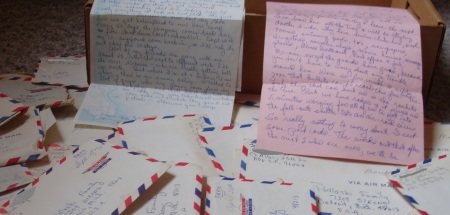
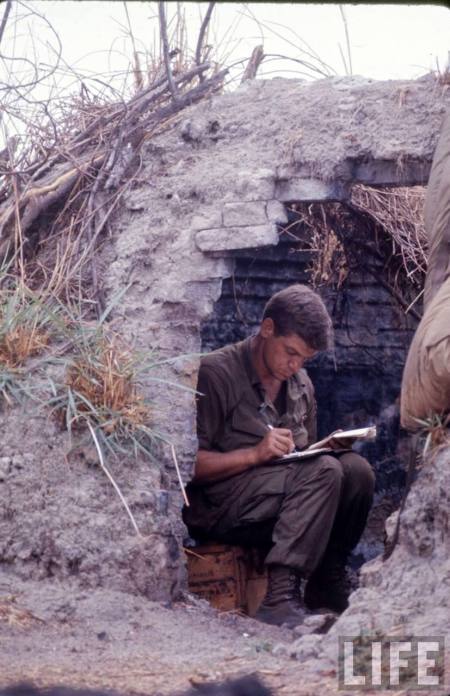
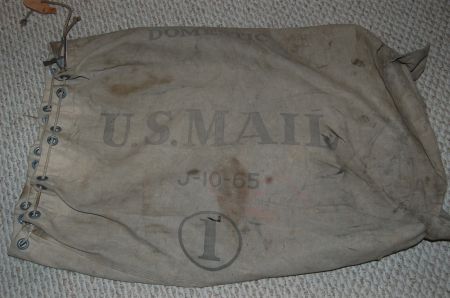

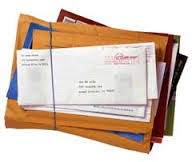

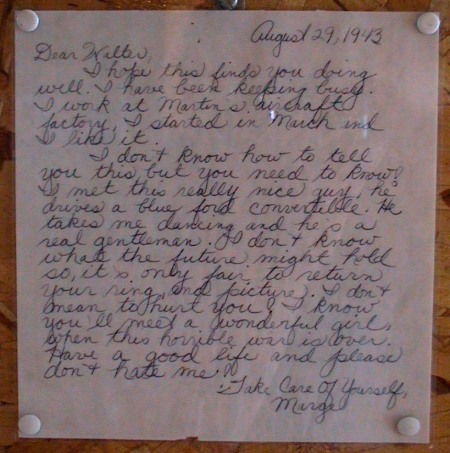



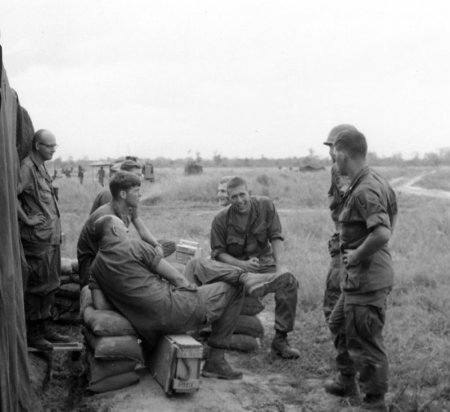
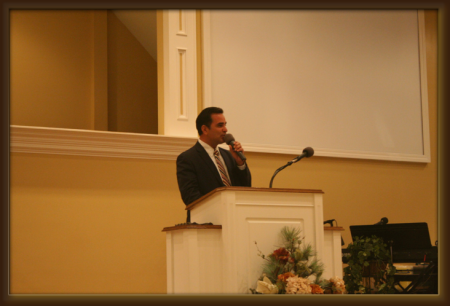


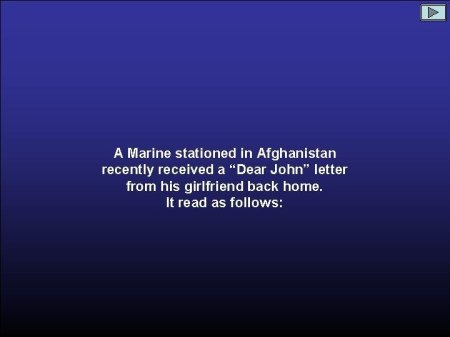
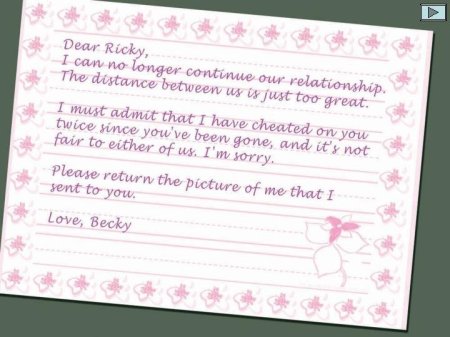
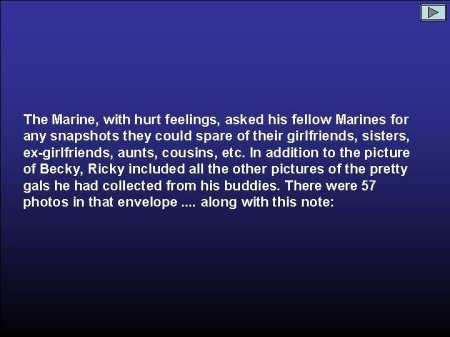
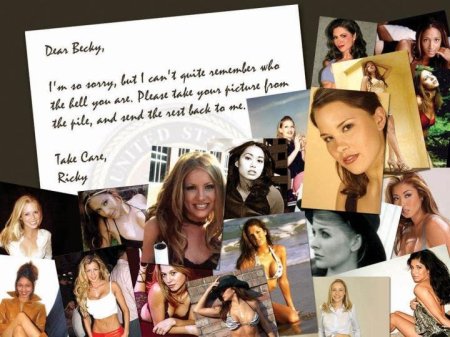

It was quite moving . My best friend got his ” dear John letter and could not fathom that here he was killing people who had never hurt him and then this .He was engaged to a girl across the street . On return he refusted to even say hello to her .
LikeLiked by 1 person
My Brother in Law was Jerry Wayne Downs. You all called him DOWNY. He was killed in Dae Nang in Sept 1966. Do any of you know him? His family would love to hear from any of you and your memories of Jerry.
LikeLiked by 1 person
Absolutely LOVE it. Beautiful memories…
LikeLiked by 1 person
August 17, 1968. As a L.Cpl with the 3rd Marines, In a bunker near Dong Ha. Still hurts … oh how it still hurts so much. If you experienced it then you know the hurt.
LikeLiked by 1 person
I served in both Iraq and Afghanistan. Dear John’s still arrive whether by “snail mail” video Skype with the “new man” in the background or by “send”. I guess the one but if progress was/is the number of females receiving them in near proportion to make troops.
My x wife did so in 08-09 while I was deployed in Baghdad operating a wrecker for a route clearance unit. To say it was “a day” would be a gross understatement, topped of with a video chat with my wife while a guy from our church cooks dinner in the kitchen ending with her kissing the guy(currently her husband) and telling me she had my folks move out my stuff. Good times.
Did you know it is a court marshal offense for U.S. servicemen to have alcohol in a combat zone nowadays? Had to wait 6 months to see/ hear from my children.
LikeLiked by 1 person
Wow, bro! That’s a knife right in the heart!
On Fri, May 11, 2018 at 9:22 PM, Cherries – A Vietnam War Novel wrote:
>
LikeLike
Dear Johns are a bitch. Heart breaking to say the least i was stationed overseas. A 19 year old kid. Your world turns upside down.even now. Almost 40 yrs later i still remember the hurt and pain. As a man and a soldier.
LikeLiked by 1 person
Dear 1970, Being here brings me back to that very time, I can remember all of us so well. It was like yesterday we were just 19. Seeing the world through the young energy & ideas, hopes for a future. I switch back & forth from feeling my thoughts then & my reality now. An unbelievable time warp…Woulda, Shoulda, Coulda, goes round & round in my head.. I read your letters to see what happened in your lives for you will always be my brothers and sisters. I care about what you were going through & how it worked out for you.. The ’60’s were really great. I’m happy for the experience, music, the change we brought! But not the war. It was not ours. I wish that Doug did not go. I’m sorry for all the suffering. As our lives come to end, I hope we are reunited with loved ones. I don’t know about Afterlife, Spirit world or Soul journey… I just wish our journey could have been happier, full of life& not so sad. Who knows where go from here? I’m tired of missing people I love. 🌷💐💙
LikeLiked by 1 person
My heart goes out all my generation who lived, loved & died. I am from the San Fernando Valley in CA. Graduated Bishop Alemany.High 1969. Patrick Douglas Erb served Oct.20.1970 to Mar.15.1971. Sylmar High 1967. Helicopter pilot. Warrant Officer 1. Crash fire. We loved eachother very much & Doug was full of life. Our generation suffered deeply. We were a generation that put love out in the universe & collectively came together. This never was our plan! Our hearts are broken..I will love Doug & miss him forever..xo Love & my deepest embrace to all who have had to go through this. ❣🌹 ✝ ✌ 💘 💌 🚁 💫 🐬 🎶 🇺🇸
LikeLiked by 1 person
Veryinformative.
LikeLiked by 1 person
Always interesting to hear from the source!
LikeLiked by 1 person
I was a child in the UK during the Vietnam war. As a child then,it was self interest later that piqued my interest at a later date. I had been brought up to have a great respect for those that fought inWW1 and WW2,and heard stories from those chaps that had served. I recall thinking how hideously those involved in Vietnam war were treated upon returning to the US,even on a humanitarian level. The numbers of lives lost beggars belief,the names upon the marble wall testament to that. The whole episode seemed so brutal.I would hope that a country’s politicians might learn from such events.Alas,they do not as we see what is going on in Afghanistan today and the body count rises.
LikeLiked by 1 person
I remember my Dear John letter. Shortly after reading the letter, we were pulling out of Subic Bay. We had an emergency with aft boiler. Instead of waiting for the “Top Watch” to tell me what to do, I pulled fires and shut down the boiler turning on of the propeller shafts. This caused us to vear towards the small island at the mouth of the bay.
The E9 chief didn’t send me to Captain’s Mast after I told him what had happened, but I couldn’t take the E5 test.
LikeLiked by 1 person
Another interesting story from my tour of duty came right after our arrival in country which melded about 50 guys from Alpha, Bravo, Charlie and Headquarters Companies with 100 guys fresh off the USNS Geiger which took us 22 days from Tacoma, WA to Vung Tau. Anyway, because they were creating a 4th rifle Company (Delta) in every Battalion and 2/3 were brand new, we trained in and around Di An for about 6 weeks. One day in the chow line, I overheard one fellow mention something about a “Dear John” letter. I said “Aren’t you married ?” He answered yes but while on the ship his wife had a miscarriage (3rd or 4th) all the while counting on the newborn to fill her days until her husband got home. She went a little unstable and repeated in the letter “I don’t love you and you’ll get your divorce papers in the mail”. I told him to go see the chaplain. When he did, the Chaplain said he couldn’t do anything and that anyone could have written that letter. About two weeks later, he got the papers in the mail and bang…he was immediately sent home to straighten things out. He received a 30 leave, got another 30 days, went AWOL for 14 days and finally turned himself in to the authorities, i.e., a local National Guard unit, I think. He came back to RVN and Delta Company to serve out his tour. In May 1968, not long before going home, he met his wife, who was several months pregnant from when he was home, in Hawaii. He returned from Hawaii, served out his tour and DEROS’ed the same day as me….no extension of his tour for time missed, no disciplinary action, like nothing happened. Kind of brings a tear to your eye, Once in a great while, you catch a break and he caught a huge one. Only a few of us in November platoon would remember his name.
LikeLiked by 1 person
Thanks for the story, Don! Some get a break handed to them and don’t even realize what it is. This guy took advantage and everything fell in place for him.
On Sat, Jul 30, 2016 at 1:06 PM, Cherries – A Vietnam War Novel wrote:
>
LikeLike
While in college I never planned past college and the service. I was sent the local newspapers by mom and I saved a lot of engagements and marriage articles. Kept in touch with a few friends in basic and advanced training, but when I reached NAM—the letters stopped. When I got home everyone that I knew had moved on. Lucky to have not to have to deal with dear john letters.
LikeLiked by 1 person
I was and am one of the very lucky ones. My wife and I wil be celebrating our 51st Feb 12, 2016. As for mail my wife sent mail 1 or 2 times a week. Once a months care pkg. One month she knew I loved honey cone and Vernors Ginger Ail, so he sent both in same pkg. 😳? Up on opening it the honey had leaked out (even though she had packed in packing peanuts) over all the peanuts and the Vernors. My buddies and I did not let one drop of the honey go to waste. Good stuff.
Vern
LikeLiked by 1 person
This article has brought back a lot of memories. I look forward to all of your blogs.
Vern Babcock (67-68) welcome home my brothers & sisters.
LikeLiked by 1 person
I was probably one of the few ‘lucky’ ones that didn’t leave ‘Jody’ food behind in the world. I did how ever receive wonderful letters and goodie boxes from family and friends. My youngest sister was babysitting my 1956 Jeep wagon while I was in Nam and she would send me a weekly update on my pride and joy. Most time I had to read these letters in the latrene mirror because she would write them backwards and up side down. I loved her letters, they kept me preoccupied. My return correspondence wasn’t as punctual as it should have been mainly due to nothing much to write about. All my Mom and Dad wanted was an envelope sent home regularly even if I had nothing to say. These kept the light on in the window.
LikeLiked by 1 person
Great read….I got dear Bill letter in Nam, but more or less expected it. I got free 30 days leave for extending a 2nd tour. While on leave we got engaged, I figured she might stop. I told her that I was going to do a 3rd tour, and she said no, I said yes, to which she said she might not be there for me. I thought this was a good test, so I was determined to do what I wanted. I spent $750 on a diamond, and said to myself it is lost money. Sure as s**t I got the Dear Bill 2months before I got out. I just kept busy, took many chances, volunteered for everything, killed VC before they got me, felt as though they couldn’t kill me. I got out with 60 days leave on the books, 10 grand I won in crap games. It was very tough, but I have made a beautiful life with my wife of 44yrs, my son, and daughter who we lost to leukemia. I had difficulty adjusting, and still do, working on that. In the end, she missed out on the best guy she will ever meet in her life time. Oh, she lost my diamond…..
LikeLiked by 1 person
I’m glad some of these women at least had the courtesy to send the ring back. My ex kept hers and probably pawned it!
LikeLiked by 1 person
This article was great this happened to me when i was in nam and like you said your brothers there did help get through it .
LikeLiked by 1 person
The article is so true. I wondered then and often since,
how many soldiers were killed by Dear John letters. As the author says, he became very risky in his actions after receiving such a letter. I think an lot of us did. It was not a popular war and it showed in the breakup of relationships. Thankfully I found my wife between back to back tours and we were married in June of 1970. She has been the very best thing that ever happened to me.
LikeLiked by 1 person
Lowell, that’s an interesting thought…I’ll have to do some research.
LikeLike
Reblogged this on Cherries – A Vietnam War Novel and commented:
I am reposting an earlier blog from 2013.
LikeLike
I enjoyed your article very much. I was in high school during the war and my fiancé broke his promise to me before he went. His words, “We are both too young to marry. I do not know what I will do on R&R, so it is only fair to you that you date others.” I was crushed. It was like a “Dear John” before he left and it came out of the blue after a week together vacationing in Colorado (skiing)…It feels rotten to be on this side of the deal too. I was a faithful and loyal finance and know that I would not have dated another and written many letters and waited for him to come home to be there to greet him. I was faithful for the entire time of his training and waited eagerly for his calls on Sunday mornings/afternoons when he would get a chance to use the telephone.
I graduated that year just 2 months after his deployment. I took his advice and dated during the summer months.. I worked as a secretary and met so many new and wonderful people. It changed my life and I married another man the following year. I have a wonderful son. As for my ex- he returned, but was never the same. I lost a great friend in that war…he turned to drugs and drinking …. eventually he died in a motorcycle accident. To this day I value and love the person he was to me. Welcome Home to all of you and keep of the great work here.
LikeLiked by 1 person
Please keep up the good work. My Dear John letter almost killed me but God is greater than a jilted promise of love. She ended up a severe alcoholic. I dodged not only my bullet but her as well. I prat for her and I am grateful I met my current wife, it will be twenty years on Wednesday October 7, 2015. Couldn’t be happier.
David Fritzlan
LikeLiked by 1 person
Congratulations on both accounts! Welcome home!
LikeLiked by 1 person
I had just turned 16 when I met my Marine, he was one month away from turning 20. He was home 14 days from boot camp when we met, we only new each other for 21 days before he lifted for Nam, but we already knew how we felt about each other. We will be married 45 wonderful years come this July. So you see a teenage girl can wait.
LikeLiked by 1 person
rember this like yesterday. i have thousands of brothers and sisters i was proud to serve with
LikeLiked by 1 person
yes, the mail. I rembere how the letter was most important hing when I was at merchan service, there the mail alwas have been a great moment
LikeLiked by 1 person
what a great concept for a site. Every one who has been oversees has stories that stand out in their lives about mail from home. We were in an isolated part of Vietnam and as people do they create alternate lives to entertain themselves. I decided that I was able to decipher the intention of the letter writer by analyzing the hand writing. It was a total reuse but we all enjoyed the game. There was a 50/50 chance that you got the Dear John letter so odds were on my side. It was just a joke but everyone gathered around to listen to how I would analyze the sweep of the last letter or the truncation of the e and the a. I had no idea what I was talking about but we spent hours analyzing letter from home. It was amazing.
Also, with regard to mail. My mother and my wife sent me sausage on a regular basis. It was awesome. We would hang it on my bunk and anyone in the group who had a knife would come by and take a bit. Also, at one point my mother, who thought that the war was suspended on Sunday, sent me an apple pie. We were at mail call and everyone who was called up got their mail which was covered in a gooey substance which smelled good. At the end of the bag the guy pulled out a package and shouted ANKE. I came up to get it and it was the offending bit in the bag. The box had broken open and the apple pie was all over everyone’s mail. We all gathered around laughed and ate the remains of the pie. What a great memory
LikeLiked by 1 person
Mail in Vietnam Was A Blessing My Sister Sent me the hometown newspaper and when I was done with it everyone in my Barracks wanted to read it
LikeLiked by 1 person
I wrote to 6 warriors in Nam, and never sent a letter like that. And always perfumed the letters, to send a piece of home, heart to remind them that I cared. I often remember the letters they sent and what became of them. Only one, Don Wilson, of San Diego,that was a heli-repairman, did I lose touch with. He was blonde, blue eyed, loved to surf and had a brother at home with his folks. 19. Last letter I got, they were close to the DMZ and beginning to take motor rounds. I never heard from him again. I was blessed to have at least two letters a week from him. I am honored to have shared a friendship, with one who may have given all. I hope I brought some joy to his darkest days. If he survived, I pray that from time to time, he remembers getting a softly scented piece of home.
Welcome home to all.
LikeLiked by 1 person
I was engaged to Patricia Blake before I was deployed in 68, She was the love of my life and I still feel for her. It’s been 45 years since and I still need closure.
LikeLiked by 1 person
Sheral, I am sure you brought a lot of joy to those men you wrote to. I saw that you were from Topeka. I was the replacement for Patrick “Mike” Berwert who was KIA (NVA Artillery). Was wondering if you might have know him. If so, and if he has relatives left in Topeka, I would like to speak to them and relate to them what Marines in our platoon thought of Mike.
LikeLiked by 1 person
Mike was killed March 25, 1968 at Dong Ha.
LikeLiked by 1 person